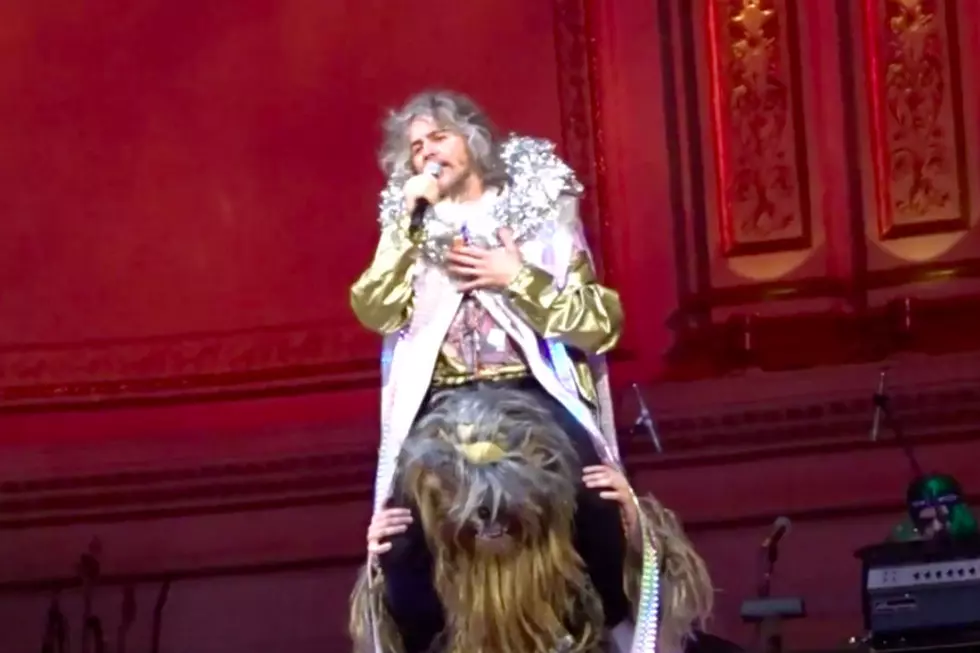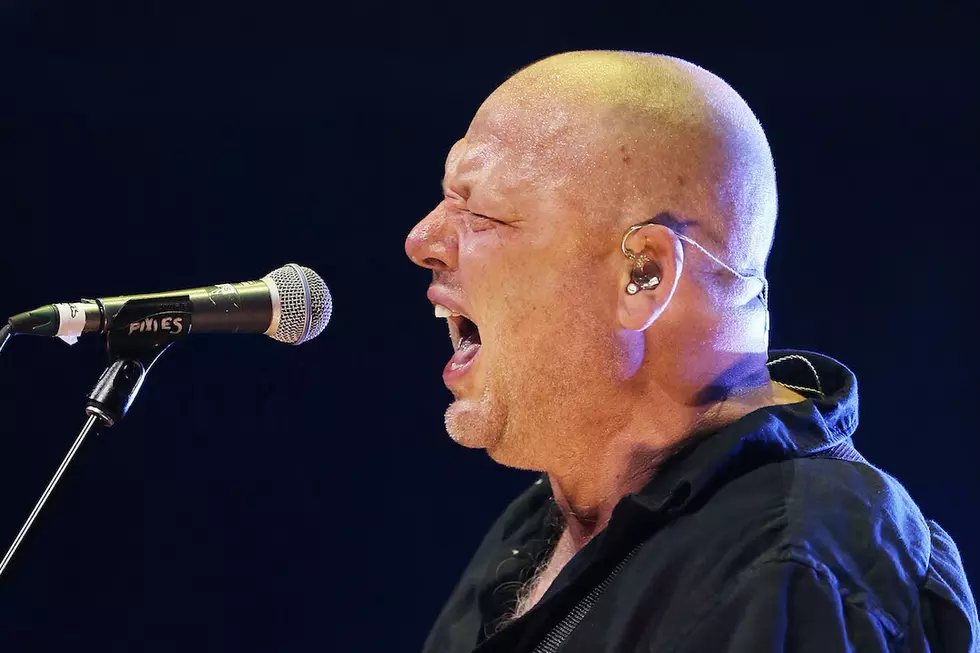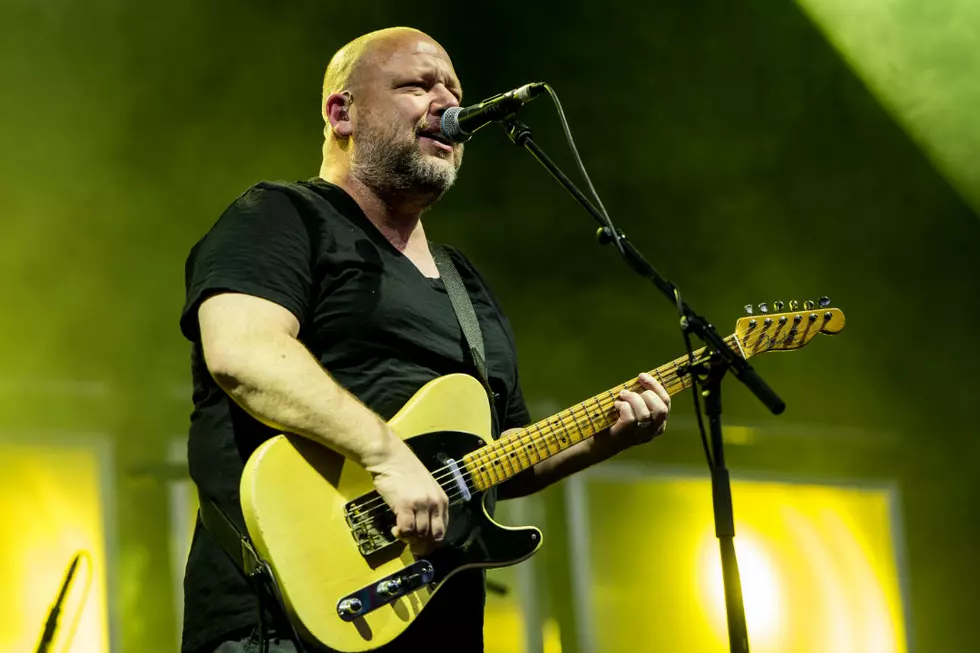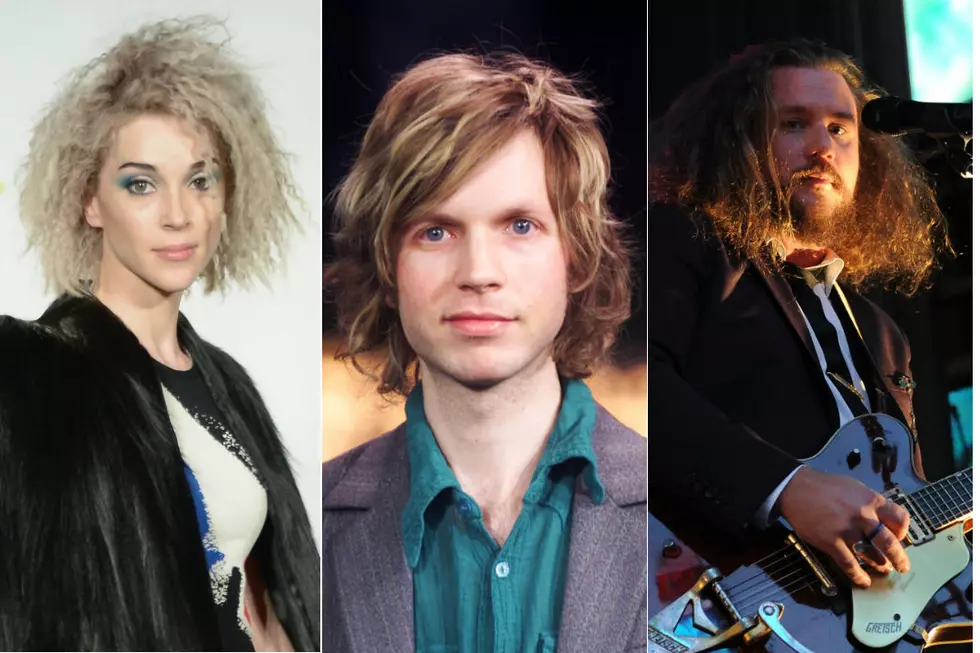
Pixies Singer Black Francis Longs for Chaos of Band’s Early Days, Calls for ‘Off the Grid’ Anti-Tech Revolution
Nearly three weeks before replacements Pixies bassist Kim Shattuck takes to Twitter to announce her dismissal, the band is in Copenhagen, and singer Black Francis is feeling uneasy.
Somewhat ironically, the architect of rock's quiet-loud-quiet dynamic trajectory -- the blueprint for 'Smells Like Teen Spirit' and hundreds, if not thousands, of classic songs since -- is struggling to reconcile the highs and lows of leading the Pixies in 2013. He gives no indication that Shattuck, who stepped in for founder Kim Deal earlier this year, will soon be handed a pink slip, but he's not exactly digging the status quo.
"Right now," Francis tells Diffuser.fm, "my world is full of stress."
Relief comes, he says, when the lights go down and he, guitarist Joey Santiago and drummer Dave Lovering step onstage and do what they've been doing since the mid-'80s, when they came surfing out of Massachusetts with a cosmic art-thrash sound unlike anything heard before. For the first time since reuniting a decade ago, they're touring behind new tunes, though that's not why Francis relishes performing.
"The good thing about doing shows right now, new songs or not, is that there's a fair amount of adrenalin and tension release that occurs when one plays a rock 'n' roll show," he says. "So, I get that every night. You know, it's very stressful because, whatever, we're trying to figure it out. What's our situation with the bass player? We don't have Kim Deal anymore, someone we played with all those years. So that's a challenge. My perception of it is that I find it very challenging to deal with being in a band that was on a reunion tour for so long."
Indeed, Pixies came into this decade in an unenviable position. They'd taken several victory laps around the world, making serious bank along the way, and yet despite all the adulation and their consistent drawing power, critics wondered how long these alt-rock legends could continue milking their beloved back catalog. Of course, the notion of recording new music carried its own set of risks, as plenty of successful reunion tours have led to cruddy albums.
Pixies ultimately decided to roll the dice, though shortly after arriving in Wales to work with Gil Norton, the producer behind their brilliant 'Doolittle' (1989), 'Bossanova' (1990) and 'Trompe Le Monde' (1991) albums, Deal announced she was leaving the band. For some fans, that was reason to dismiss on general principle 'Bag Boy,' the excellent comeback single that dropped out of thin air in June, as well as the subsequent 'EP-1,' the first in what promises to be a series of non-album releases.
The extent to which Pixies devotees care about the individual members -- particularly Deal, whose distinctive bass thudding, background vocals and overall coolness have made her a hero to young girls -- isn't lost on Francis. His is a group made up of larger-than-life individuals, alt-rock superheroes. That makes for some super-size drama.
"I feel like I’m comic book character," Francis says. "It’s not necessarily a bad thing. It makes certain things more emotional for everybody. The band, audience, everybody."
If Francis can understand the disappointment regarding Deal's departure, he's never been particularly sentimental about such things. The singer, songwriter and guitarist born Charles Thompson and referred to in post-Pixies solo endeavors as Frank Black discovered music at an early age, and he says he never viewed rock stars as peers or people whose lives he was in a position to question.
"All the drama was interesting, I guess," he says. "All the behind-the-scenes soap operas -- I picked up on that. But you know, I never really felt invested in a band’s particular personalities that I would fault them for having a lineup change. Either the music was good or it isn’t."
As for whether Pixies' new music is good, that depends who you ask. Reactions to 'EP-1' have been mixed, even though the four-song set finds the group's core trio balancing progress and nostalgia in interesting ways. Lead-off track 'Andro Queen' is a shimmering space-age love ballad, while 'Indie Cindy,' with its terse spoken-word verses, could almost be a Hold Steady song. 'Another Toe' is a pleasant rocker that's innocuous at worst and infectious at best. Most importantly, none of the above are '90s rehashes, and even 'What Goes Boom,' the most traditionally Pixies-esque song of the lot, is crunching and catchy enough to warrant public airings when the group heads out next month on a North American tour with Cults, FIDLAR and Best Coast.
But on the afternoon of his Diffuser chat, it's not the audience's response to the new stuff that's weighing on Francis' mind. Even with the constant questions about Deal and pressure from critics -- Pitchfork gave 'EP-1' a 1.0 out of 10 -- things feel safe and easy. The bus is comfortable and the meals are paid for, and the cushiness is starting to chafe.
"I guess I'm kind of nostalgic for younger, more naive chaotic times," Francis says. "I just feel like I'm in the Boy Scouts or something. It just feels like it's really under control and military operation and everything. It's cool. We don't spend money on stupid s---. We still drink and order whatever we want, so it's a nice balance between the riches and the blue-collar ethic, which is very much a part of the band. So I enjoy that, but I guess I just feel like I'm the singer in a band and we're not really riding a wave any more. We're still kind of sort of kind of in the circuit of the Pixie appreciation society."
"It’s stupid to say, but I want to be in a van and playing in some s---ty clubs for a couple of months," he adds.
In addition to longing for the kinds of small rooms Pixies played back in the day, before they signed with 4AD and made crop circles in the prairie land of what would become Alternative Nation, Francis pines for a time when people actually watched and enjoyed shows rather than fiddling with their smartphones the whole time. Our addiction to handheld devices is just the latest development in the digi-fication of the world, and while tech enthusiasts celebrate streaming services like Spotify and talk up all of the wonderful new ways musicians can interact with fans, Francis is dubious.
"I’m starting to become a naysayer," he says. "I’m starting to not buy into the revolution. I don’t know how much it’s really changed the big picture. So yeah, people don’t really sell records anymore. People get music for free. Low and behold, concert tickets are three times as much as they used to be. It all just kind of shifts around."
What music needs, he says, is for a bunch of brave artists to make like the straightedge kids of the '80s or the abstinence advocates of the post-AIDS '90s and decide their lives are better without certain types of distractions. And if this movement gets going, Francis may learn about it via face-to-face conversation, as he's thinking of throwing away his cell phone.
"I look forward to someone starting an off-the-grid revolution," he says. "'Yeah, we make music,' or, 'Yeah, we write poetry. We do whatever it is we do. We make films. F--- y’all and your stupid goddamn grid. No, we don’t have a website. No, we don’t post anything. No, we don’t blog. No, we don’t have a Twitter account. We have nothing to do with that s---. What we do is f---ing real. You want real? Or do you want electronic?'"
More From Diffuser.fm









